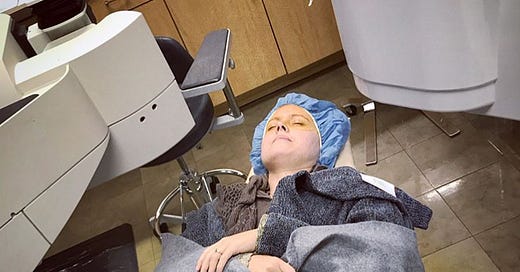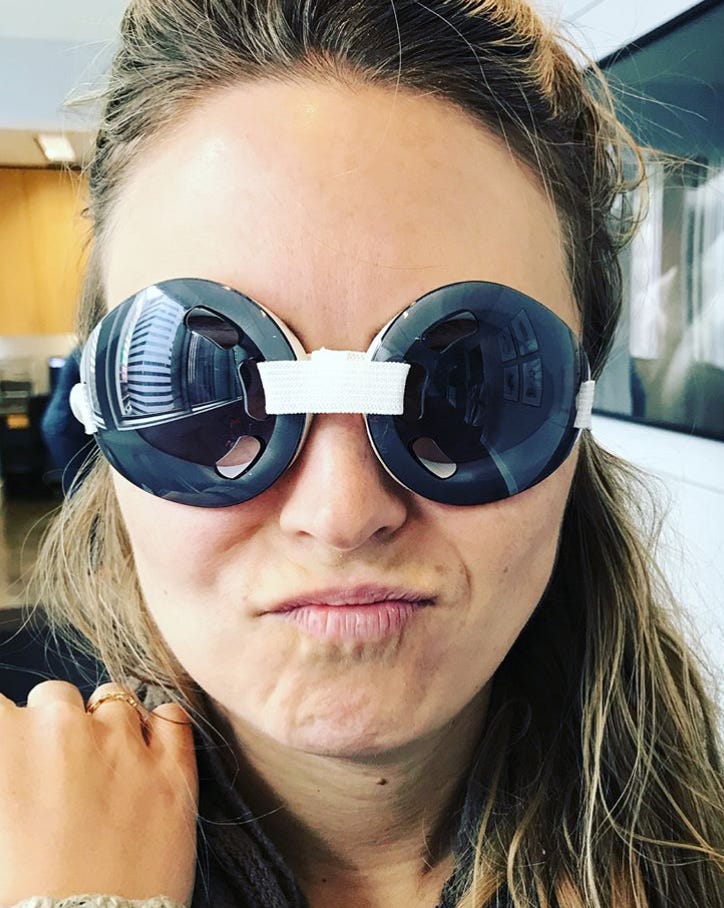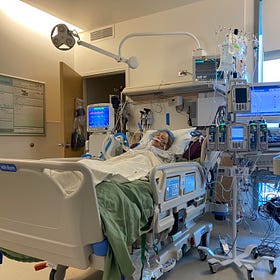Greetings Gorgeous Substack Readers,
Wow, the response to our act of service is truly overwhelming. I think the world desperately needed a bit of light.
But as my substack readers know, you all are the light for me.
Above is a photo of me right before a surgery for my eyes. I’m trying to stay calm and peaceful. There are so many people in my life getting procedures right now. It’s never easy to undergo a surgery - so let’s talk about it.
And maybe save this post for the future or send to a nervy loved one. Let’s get through this together.
Reduce Medical Procedure Anxiety
It happens to the best of us. Nothing makes us anxious quite like the time leading up to a medical procedure. I’m not even sure which is scarier - going under anesthesia or staying awake - which is an added layer of deeply distressing.
Tomophobia is the technical name for a fear of surgery. Fearing a medical procedure is completely normal and natural.
But here are some tips from me to help conquer those butterflies the size of elephants.
BEFORE THE PROCEDURE:
The first thing I tell everyone in the lead up - it’s never been a better time to be a patient. The technology is astounding. So keep that in your mind.
If you have trust in your doctor and facility, then you’ve done 80% of the work to calm yourself. If you feel like the decision to proceed with the plan was a team decision after weighing pros and cons, that quells so much anxiety right there.
Ask yourself, are you the kind of person who likes to know the details to feel in control, or do you need to not research too deeply?
Sometimes we are both.
For example, in the lead up to getting Lasik, I found information calming. I learned how fine the laser actually is, what would happen if there was an earthquake, and how skilled my physician was (he literal wrote a book on the procedure).
They gave me anxiety meds and I was truly at ease.
But learning all the specific details of a c-section was too overwhelming.
For me, I tend to try to learn the basics of any procedure so I can ask questions. I don’t like surprises. Asking questions allows my creative brain to visualize with more accuracy - but sometimes that ability to visualize is just a fantasy that makes me more nervous.
I avoid medical photos of real procedures. They are too intense for me. If I start researching and my cringe-meter starts going off, I put it aside. That’s the sign that I should stop.
But I don’t stop thinking about the parts of the procedure it’s important for me to understand.
What is the plan for sedation or pain control? Always ask this. This allows us to be part of the team. Maybe we need a Xanax if we’re awake? How long is the procedure? Don’t be shy about asking questions.
Asking questions means you’re a person who gets answers.
But then, once I gather information, I compartmentalize. Obsessing is not healthy for the body. Compartmentalizing gets a bad rep, but I think it’s important to be able to set down troubles.
A good way to settle the mind, write down all your thoughts/questions and just save it for the doctor appointment. It’s okay and smart to tell your doctor or nursing staff your concerns.
But beware of letting those thoughts creep in over and over. Stay busy and distracted. Stress isn’t helpful to your cells.
Often after a procedure, we need a lot rest and rehab. So before it, make a list of all the things you’d like to get done while you’ve got more energy. There are lots of to-do’s or chores to wrap up - sometimes it's prepping for a work absence, or maybe meal prep. Also before a procedure is a great time to give your caregivers some TLC - take them to something fun like a movie or make them dinner.
As the time of the procedure looms, be sure to read any prep documents a few times. Make note of eating instructions, important necessary post op items, and communicate with your caregivers about transportation. Get your post-operative plan clarified and confirmed a few days before the procedure.
In the days leading up, try stress reducing activities like a hike, or acupuncture, massage, meditation, EFT tapping and talking to a therapist if that helps.
Don’t forget to give your pets some extra love. It’s a mutually beneficial relationship and calming.
DAY OF THE PROCEDURE:
The morning of a procedure can be intense. Remind yourself, maybe even with a sticky note on the bathroom mirror, if you are not allowed food or liquids.
Try to stretch your body if you feel tension and play some soothing music.
When you get to the medical facility, before you begin, touch base with your medical professionals and tell them what would help you. For example, if I’m awake during the procedure, I love verbal check-ins when they can. I don’t want them distracted, but I find it comforting to know how it’s going and when it’s almost done.
I tell them I trust them. It’s a deeply vulnerable moment of surrender. If it’s a doctor or surgeon I’ve never met before, give them some inspiration so they know what’s at stake, “Thanks for taking care of me. I’m excited to get home to my two-year old.” And then I show them a photo.
Touching base with the anesthesiologist is really comforting if you’ll be out for the surgery. They can be your advocates, so tell them how you’re feeling and any lingering, gnawing worries.
Encourage your entire medical team to “work at the top of their license,” as Susannah Fox, patient-led care author and expert says.
Sometimes you can weigh in on a music playlist or audio book to play.
Then, I let go. I say a prayer for trust and strength. I make it a point to just visualize myself healing afterward in my bed - just to say to my brain, “I’ll be on the other side of this soon.”
Sometimes I visualize myself on a beach on vacation. I take my brain to a place where eventually I will be - safe and calm.
Perhaps my most unique tip: I’ve found that if I'm awake during a procedure, I like to chant.
I started chanting during my pregnancy. Around twelve weeks pregnant, I got two third degree burns on my leg. During daily wound changes that were incredibly seepy and painful, I started repeating, “Jesus, Buddha, Muhammad, Lucille Ball '' over and over. I found it helped me overcome the skin searing pain. Eventually, I decided to learn about Buddhist chanting and something just felt right on a physiological level. “Nam Myoho Renge Kyo” translates from Japanese to roughly “I take refuge in the Lotus of the Wonderful Law.”
I’ve chanted through my c-section and many other painful situations and procedures. It works physiologically to soothe and stimulate my vagus nerve in a way that feels calming. I find the words flow out of me in a powerful way.
If the Buddhist chant is too overwhelming or you forget it, try just “Om.”
The vocalization part is key, because the vibrations in your throat are what soothe you. Also it helps me to remember to breathe.
We often hold our breath when we know pain is coming, but breathing through difficult times allows us to find our power. Before breathing was triggering for me (three time ventilator champ, here), I liked doing box breathing. It’s a method of calming and controlling breathing to help us avoid rapid and shallow stressed breath.
A simple one if chanting or focused breathing isn’t an option, plus great for adults and kids, wiggle your toes during intense moments. I learned this in the hospital from my favorite surgery nurse. While this may not be possible if the actual procedure is on your foot itself, redirecting your focus works really well. I even use this one during blood draws or vaccinations.
Also keep in your head, this moment in time is temporary and I’ll be on the other side of this discomfort soon.
And remember, all this advice is coming from a champ who had EVERYTHING GO WRONG. And this is my approach. My fear is extremely validated and I still know, odds are, everything is going to be fine.
I’m not perfect. I get rattled too from time to time. But leaning back on these tips really helps me keep my perspective.
After one procedure, a nurse said to me, “you have a really great attitude.” She had spent the last hour prepping me, holding my hand during the surgery, putting pressure on my open wound to help the surgery glue stick, and sending me home. She watched me prepare, chant, and pass through the experience.
I don’t like being a patient, but I’ve gotten better at it as time has gone by. It’s a skill, truly. And I’m happy to pass on my learnings to you.
Be well.
What helps you keep your nerves in check? Drop a comment! I’d love to hear.
NEWS:
I have been featured in Canvas Rebel Magazine talking about resilience, my layoff, and what I hope for my life’s legacy. “I hope my legacy reminds people that even amidst the most dire of challenges – growth, strength, laughter and joy are accessible to us all, leading us to greater purpose and fulfillment.”
Comment of the Week:
“Riveting writing as usual - can’t wait for this full book!”
it is a serious thing // just to be alive - part 1
Thank you especially to those who have read each week! Your kindness and support truly means the world to me. Please consider sharing the Substack with those in your world who might get support from these words. I know the picture above is hard for some folks to see. It was my lowest, scariest moment. I’ve come so far.
If you’re new here and wondering, “what happened to this lady?” read:
I started writing this when I was on dialysis. It’s intended to be both memoir and a practical tool to help folks who might be going through something similar or those caregivers and family supporting someone with a challenging diagnosis. NOTE: This is not intended to replace actual medical guidance. Please consult your doctors on your individual challenges and situations. Please talk to your clinicians before adjusting any of your care protocols. Also names have been changed for most of my medical staff.
Thank you to new founding level donor CC Couchois. You and Pat are such angels and we feel so lucky to be in your orbit. Thanks for loving JJ - I know she loves you both!
Thank you for new donor member Leslie Kitziger. You are a light to me. I’m so grateful.
Thank you to Roy Lenn and Dr. Richard Burwick for your founding level donation.







